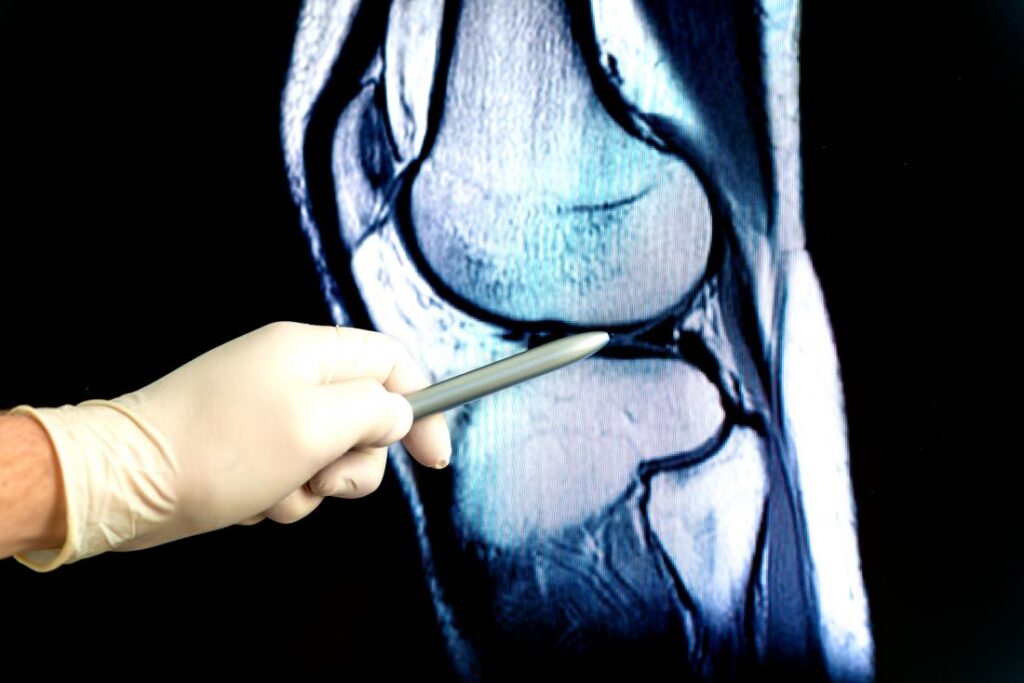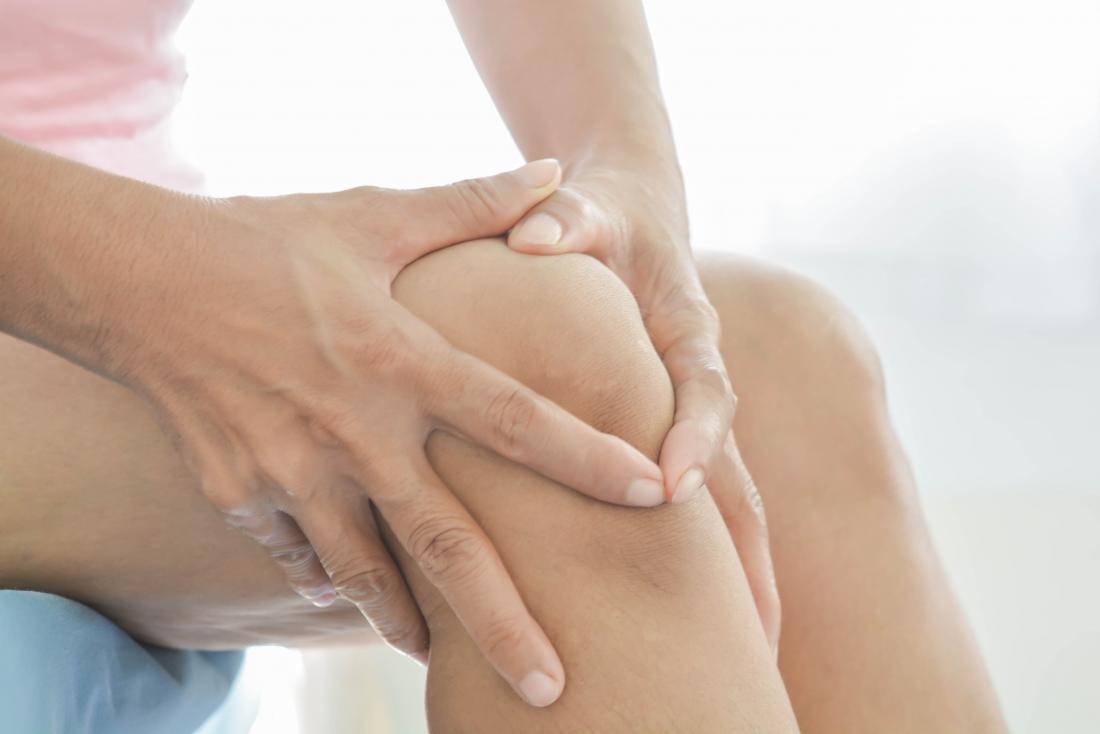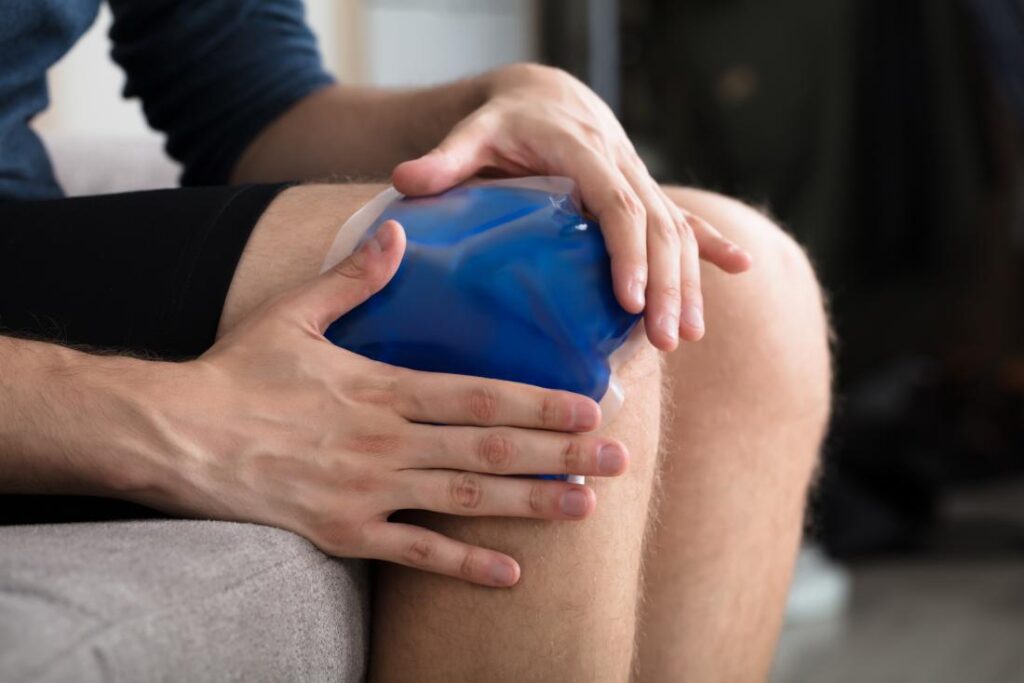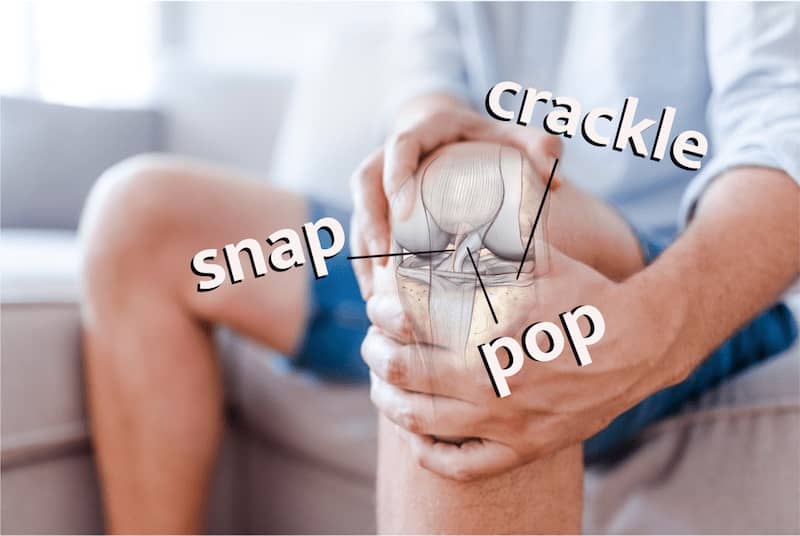UNUSUAL KNEE POPPING OR CRACKING: CREPITUS
You may occasionally hear snaps, pops, and crackles when you bend or straighten your knees. You may even feel a cracking, crunching, or popping sensation when you walk or climb the stairs. These sensations are known as Crepitus.
This affects different parts of the body commonly in the knee. The sound or sensation is the result of:
- Air bubbles develop in body tissues,
- Snapping of tendons or ligaments over the bony structures in the knee,
- Patellofemoral pain syndrome (PFS),
- Torn cartilage, or
- Osteoarthritis (OA).
You may hear the cracking, popping, or snap sound when you extend your knee. You may sometimes be able to feel crunching or cracking if you place your hand over the knee and bend or straighten it.
People often describe the sound or feeling as “popping, snapping, catching, clicking, crunching, cracking, crackling, creaking, grinding, grating, and clunking.” Knee crepitus is more common among older people, but it can happen at any age. It can affect one or both knees.
Knee crepitus is usually harmless, but if it occurs after a trauma or if there is pain and swelling, it may require medical attention.

KNEE ANATOMY
The knee is the largest joint that works like a large hinge. The knee joint consists of bones, cartilage, the synovium, and ligaments.
- Bones: The thighbone or femur joins the knee to the long bone of the lower leg or tibia. The bone in the lower leg or fibula is also connected to the joint. The patella or kneecap is the small, convex bone that shields the joint, sits at the front of the knee.
- Cartilage: This reduces the friction where the two bones meet. The knee consists of two thick pads of cartilage called the menisci cushion the tibia and femur.
- Synovium: It is a special type of connective tissue lining the joints and tendon sheaths. Synovial fluid acts as a lubricant to the joints.
- Ligaments: Your knee joint has four tough ligaments, flexible bands that stretch across the uneven surface of the joints connecting the bones.

CAUSES OF KNEE CREPITUS
Crepitus can result from various reasons, including:
- Air Bubbles: The popping or cracking sound can result from air seeping into the soft tissue, finding its way into the area around the joint, and causing tiny bubbles in the synovial fluid. When you bend or stretch your knees, the bubbles can burst with a popping or cracking sound that may be alarming, but it is usually harmless.
- Injury or Damage to the Knee: It might also result from underlying medical conditions such as tissue damage or lesions. In case you feel pain as the knee snaps or catches, it can be due to scar tissue, a meniscus tear, or a tendon is moving over a protruding bone within the knee joint. The pain or swelling sometimes indicates a more serious problem, like patellofemoral pain syndrome (PFS), a tear in the cartilage or other soft tissue, or osteoarthritis (OA).
- Ligaments: The ligaments and tendons connecting the bones of the knee may stretch slightly as they pass over a small bony lump. Once they snap back into place, you may hear a clicking sound in the knee.
- Patellofemoral instability: The instability in the various tissues and components that make up the knee, either from birth or due to age, injury, or life events may lead to noise or sensation. Your knees might bend more than another person’s, or your kneecaps may move more freely causing the noise.
- Surgery: Surgery may lead to more noise or sensation in your knees, due to minor changes during the procedure or, in the case of joint replacement, features of the new joint.
- Torn Cartilage: Torn meniscus could also cause crepitus. A meniscus tear can result from sports activities, age, or thinning of the meniscus. Symptoms apart from noise and sensation include swelling, stiffness, and difficulty extending the knee.

TYPES OF CREPITUS
- Pathological Noises: These are normally linked to a specific incident or injury, like a popping sound with an ACL injury or a meniscal tear. Pathological noise can also be caused due to degenerative changes, pathological plica, patellofemoral instability, pathological snapping knee syndrome, and post-surgical crepitus. You may also have additional symptoms of pain, swelling, and joint effusions.
- Physiological Noises: These are more common than pathological noises that have no correlation to pain or function and are simply just noise. You may often find the noises alarming and worrying.
SYMPTOMS OF CREPITUS
The joint sounds or crepitus can be a normal part of the movement. You may experience popping joints, especially as they get older. You may also experience:
- Popping or cracking while bending your knee.
- Crunching sounds in your knee when you climb stairs or kneel.
- Crackling or grinding sounds when you move the knee.
- Crunching sensation when you move you’re leg.
- Random or continual swelling around the joint.
- Applying heat and ice packs for crepitus

TREATING CREPITUS
Usually, crepitus is harmless and needs no treatment. You should see a doctor if you have pain or other symptoms with a crunchy knee. The treatment will depend on the underlying cause.
The healthcare provider will recommend:
- Weight management
- Exercise and physical therapy
- Nonsteroidal anti-inflammatory drugs (NSAIDs)
- Prescription medicines, including steroid injections
- Applying heat and ice packs
- Cognitive-behavioral therapy
In severe cases, surgery or joint replacement may be required. Prescription medication can ease pain and may promote overall well-being.
Natural medicines also have a positive effect to treat joint pain caused by crepitus. These would include:
- Curcumin
- Resveratrol
- Boswellia (frankincense)
- Certain herbal tinctures and teas
TAKEAWAY
The cracking, snapping, and popping sounds and sensations in your knees aren’t usually a cause for concern, and most people don’t need treatment. But, if you have pain, inflammation, or other symptoms with noisy knees, you should see a doctor.
Prevention is best to avoid future knee problems with exercise, diet, and weight management. These are also beneficial in managing symptoms and slowing the damage to your knees if you have any medical condition like osteoarthritis.
PEOPLE ALSO READ:
If you or anyone you know is knee crepitus, our expert providers at Specialty Care Clinics will take care of your health and help you recover.
Call us on (469) 545-9983 to book an appointment with our specialists.
